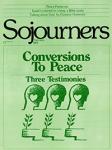In the late fall of 1982 we gathered at Kirkridge, a retreat center in the Pocono Mountains of Pennsylvania. Fifty-two leaders of the Christian peace movement met for more than two days of Bible study, prayer, fellowship, and "discerning the times." Present were peace workers from nine denominational offices, members of religious communities, staff members from national peace and justice organizations, local organizers, pastors, theologians, and longtime peace activists.
This was the first time that such a broad and diverse group had come together. We had been brought by our common vision and commitment to peace. It was not to be a time for strategizing, arguing, or initiating new plans and projects. Rather, these would be days in which to study the Bible together, to pray, to strengthen the bonds between us, and to seek to better understand our historical situation and the things to which God might be calling us.
We knew we needed to be together. The peace for which we pray and labor must take deep root in and among us. There is no more room for the personal and organizational rivalries, petty jealousies, ego conflicts, turf protection, constituency battles, and institutional competition that can so easily beset us. God has called us to something better. The reconciliation for which Jesus died has made us one, and our dangerous world needs that unity.
Each session at Kirkridge began with worship and prayer. A Bible study followed, and, after some time away for individual silence and reflection, we returned to discuss the meaning of the biblical word in our historical situation. We sensed that leadership from the church at this point is crucial for the sake of the country, for the sake of the peace movement, and most importantly, for the sake of the gospel.
The historical precedent of the 19th-century abolitionist movement serves as an example of how faith can be applied to a fundamentally moral question and has been a great inspiration to many of us. It was, in fact, the five groups who put out the New Abolitionist Covenant that convened the retreat at Kirkridge (Sojourners, Fellowship of Reconciliation, Pax Christi, New Call to Peacemaking, and World Peacemakers). The covenant expresses the deep conviction of peace felt by many in the churches. Since it was" first published just a year and a half ago, almost a million copies have been distributed. Many at Kirkridge believed that the abolitionist idea may be the right theme to both unite us and offer a clear initiative to move us ahead. A new abolitionist movement has begun and is gaining strength.
The days at Kirkridge proved to be rich and fruitful, both for discerning the shape of our peacemaking and for building the bonds of trust and friendship that will strengthen and nourish future struggles.
The gathering testified to the breadth and depth of Christian peacemaking in the U.S. churches. During the last session people lifted up calls to resist Trident, to refuse war taxes, to stop the funding of MX, to join with Europeans to stop the Pershing II and cruise missiles, to further develop the abolitionist theme, to join together in congregation- and community-based witness, to deepen our roots in prayer, and much more. It was heartening to see that calls for both civil disobedience and legislative initiatives against the arms race were felt to be complementary rather than competitive.
Throughout the time together voices testified to the connection between our labor for peace and our struggles for economic and racial justice. Many of those present had their roots firmly in the struggles of the poor and the oppressed. No longer can we allow the work of peace and the struggle for justice to be divided by those with vested interests or narrow visions. The Bible makes the spiritual and political linkage between the two absolutely clear.
I came home exhausted but quite happy. Perhaps the Christian peace movement is a little more peaceful for some of us having been together at Kirkridge. God's grace was surely with us through the weekend. There was strong sentiment expressed about the need for an annual retreat of Christian peacemakers where, again, biblical reflection, prayer, fellowship, and discernment would be the focus. Dominga Zapata, a lay woman from Chicago, expressed it well: "Sometimes we get so busy in our work for the Lord that we forget all about him."
One participant, who spends a good bit of his time attending conferences, thought the effects of this gathering would be felt for a decade. Another veteran peace activist asked, "I wonder how early gatherings at the beginning of the Confessing Church movement in Germany felt. They must have felt something like this." For me, it was a great confirmation that when we stop talking long enough to listen to God and to each other, the Spirit has an enormous capacity to bind us together, enlarge our vision, and create new possibilities.
Jim Wallis is editor-in-chief of Sojourners.

Got something to say about what you're reading? We value your feedback!
